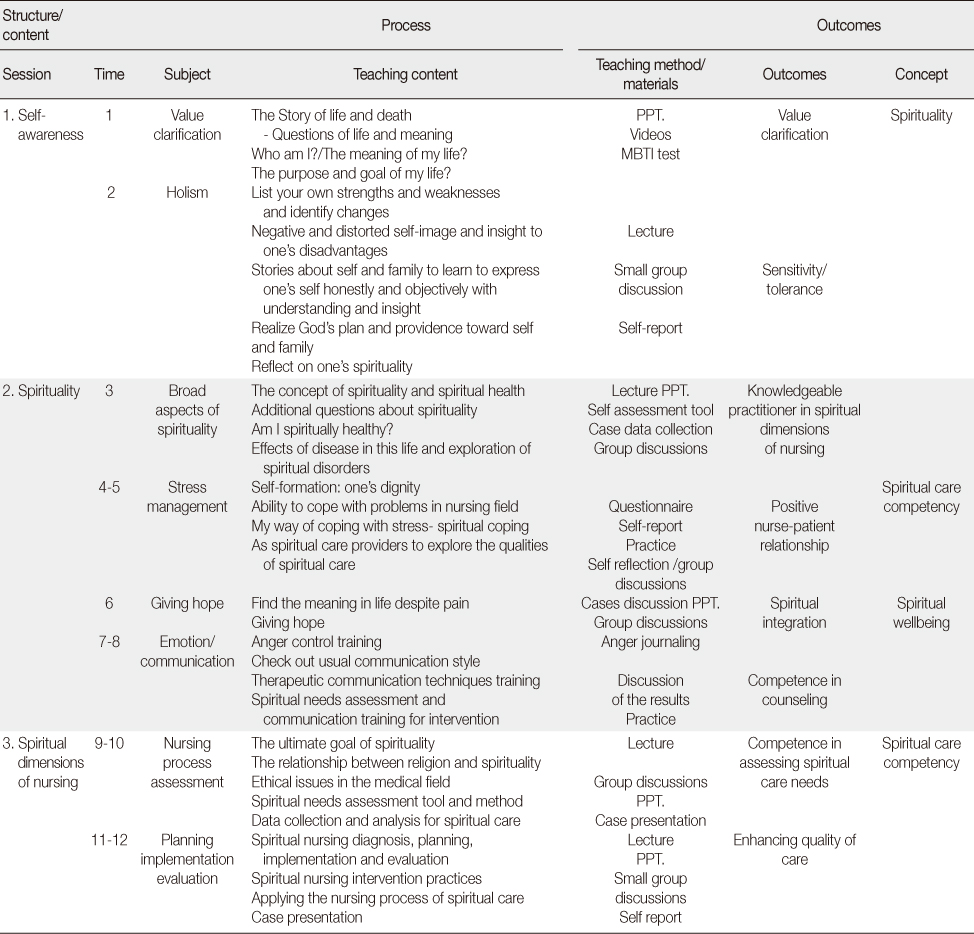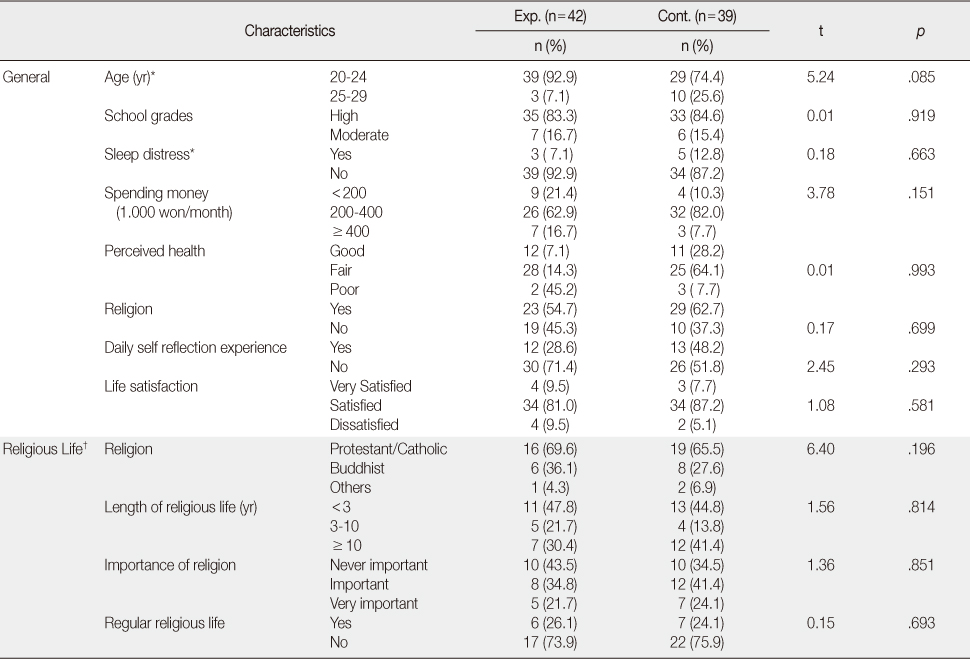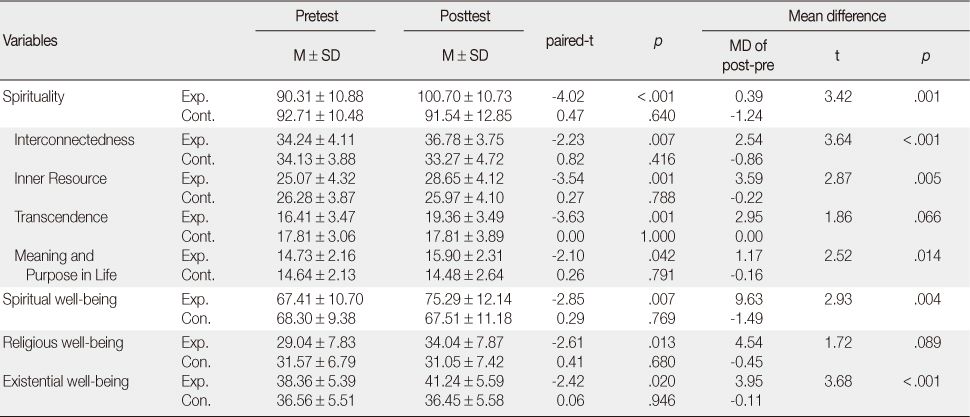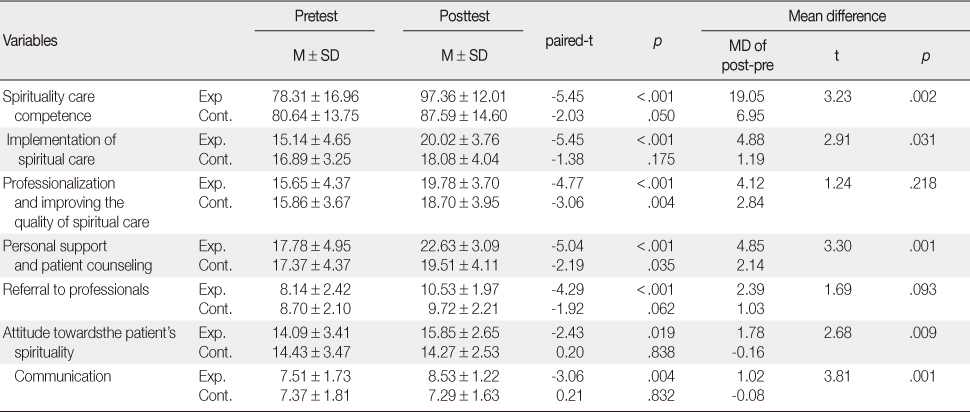Articles
- Page Path
- HOME > J Korean Acad Nurs > Volume 41(5); 2011 > Article
-
Original Article
- Development and Effectiveness of a Spiritual Care Education Program for Nursing Students - Based on the ASSET Model
- Mi Ja Chung, Young Eun
-
Journal of Korean Academy of Nursing 2011;41(5):673-683.
DOI: https://doi.org/10.4040/jkan.2011.41.5.673
Published online: October 31, 2011
1Assistant Professor, Department of Nursing, Gwangyang Health College, Gwangyang, Korea.
2Professor, College of Nursing, Gyeongsang National University, Gerontological Health Research Center, Gyeongsang Institute of Health Sciences, Jinju, Korea.
- Address reprint requests to: Eun, Young. College of Nursing, Gyeongsang National University, Gerontological Health Research Center, Gyeongsang Institute of Health Sciences, 92 Chilam-dong, Jinju 660-751, Korea. Tel: +82-55-751-8873, Fax: +82-55-754-0484, yyoeun@gnu.ac.kr
© 2011 Korean Society of Nursing Science
Abstract
-
Purpose
- This study was done to develop a spiritual care education program (SCEP) for nursing students to help increase their awareness of the essence of spirituality in care so as to enable them to promote spiritual well-being and spiritual care competence.
-
Methods
- The participants were assigned to an experimental group (n=42) or a control group (n=39). From August to October 2009, the experimental group participated in the SCEP, which were held 2 hours a week for 6 weeks. The data were analyzed using χ2-test, Fisher's exact probability test, paired t-test, t-test with the SPSS WIN 17.0 statistics program.
-
Results
- The experimental group had a higher mean score for spirituality, spiritual well-being and spiritual care competence than the control group. Significant differences were found between the experimental group and the control group.
-
Conclusion
- The results of this study indicate that the SCEP was effective in improving spirituality, spiritual well-being and spiritual care competence for nursing students.
- 1. Baldacchino DR. Teaching on the spiritual dimension in care: The perceived impact on undergraduate nursing students. Nurse Education Today. 2008a;28:501–512.ArticlePubMed
- 2. Baldacchino DR. Teaching on the spiritual dimension in care to undergraduate nursing students: The content and teaching methods. Nurse Education Today. 2008b;28:550–562.ArticlePubMed
- 3. Choi MH, Kim KH, Kim KO, Kim KS, Kim SK, Kim JS, et al. A study on needs for the aged's spiritual nursing care. Chung-Ang Journal of Nursing. 2001;5:1–9.
- 4. Dunn JD. Powerlessness regarding health-service barriers: Construction of an instrument. Nursing Diagnosis. 1998;9:136–143.ArticlePubMed
- 5. Faul F, Erdfelder E, Lang AG, Buchner A. Statistical power analyses using G*Power 3.1: Tests for correlation and regression analyses. Behavior Research Methods. 2009;41:1149–1160. doi: 10.3758/BRM.41.4.1149.ArticlePubMedPDF
- 6. Highfield ME. Spiritual health of oncology patients. nurse and patient perspectives. Cancer Nursing. 1992;15:1–8.PubMed
- 7. Hoover J. The personal and professional impact of undertaking an educational module on human caring. Journal of Advanced Nursing. 2002;37(1):79–86.ArticlePubMed
- 8. Howden JW. Development and psychometric characteristics of the spiritual assessment scale. 1992;Denton, TX, USA, Texas Woman's University. Unpublished doctoral dissertation.
- 9. Kang JH. A study for the spiritual well-being of cancer patient. 1996;Busan, Pusan National University. Unpublished master's thesis.
- 10. Kang SR. Concept analysis of spiritual care. Journal of Korean Academy of Nursing. 2006;36:803–812.ArticlePubMedPDF
- 11. Kim JN, Park KM. The influences of spiritual care nursing education towards death and dying. Journal of Korea Community Health Nursing Academic Society. 1999;13:114–127.
- 12. Koh MS. Experiences in spiritual nursing care by student nurses before starting nursing practice in hospital: Part I. Journal of Korean Academy of Fundamental Nursing. 2002;9:462–472.
- 13. Koh MS. A study of nursing student's spiritual care experiences. Journal of Korean Academic Society of Nursing Education. 2003;9:175–185.
- 14. Lee HI. Correlation between spiritual well-being and mental health of nursing students. Journal of Korean Academy of Nursing. 2002;32:7–15.ArticlePDF
- 15. Lee MH, Kang HK, Park JK. A study of spirituality of nursing students (No. 2, 7-22). 2003;Busan, Kosin University, Research Institute of Holistic Nursing Science.
- 16. Lovanio K, Wallace M. Promoting spiritual knowledge and attitudes: A student nurse education project. Holistic Nursing Practice. 2007;21:42–47.ArticlePubMed
- 17. McSherry W, Gretton M, Draper P, Watson R. The ethical basis of teaching spirituality and spiritual care: A survey of student nurses perceptions. Nurse Education Today. 2008;28:1002–1008.ArticlePubMed
- 18. Narayanasamy AJ. ASSET: A model for actioning spirituality and spiritual care education and training in nursing. Nurse Education Today. 1999;19:274–285.ArticlePubMed
- 19. Oh PJ, Chun HS, So WS. Spiritual assessment scale: Psychometric evaluation of the Korean version. Journal of Korean Oncology Nursing. 2001;1:168–179.
- 20. Paloutzian RF, Ellison CW. Peplau LA, Perman D. Loneliness, spiritual well-being & the quality of life. In: Loneliness: A source-book of current theory research & therapy. 1982;New York, NY, John Wiley & Sons. 124–134.
- 21. Pesut B. The development of nursing students' spirituality and spiritual care-giving. Nurse Education Today. 2002;22:128–135.ArticlePubMed
- 22. Rogers C. Teaching adults. 1996;2nd ed. Philadelphia, PA, Open University Press.
- 23. Shih FJ, Gau ML, Mao HC, Chen CH, Kao LH. Empirical validation of a teaching course on spiritual care in Taiwan. Journal of Advanced Nursing. 2001;36:333–346.ArticlePubMed
- 24. Shin KH. Educational life of Carl Rogers and meta-education. Journal of Educational Principles. 2002;7(1):133–164.
- 25. Taylor EJ. What is spiritual care in nursing? Findings from an exercise in content validity. Holistic Nursing Practice. 2008;22:154–159.PubMed
- 26. Tilden VP, Nelson CA, May BA. The IPR inventory: Development and psychometric characteristics. Nursing Research. 1990;39:337–343.PubMed
- 27. van Leeuwen R, Cusveller B. Nursing competencies for spiritual care. Journal of Advanced Nursing. 2004;48:234–246.ArticlePubMed
- 28. van Leeuwen R, Tiesinga LJ, Middel B, Post D, Jochemsen H. van Leeuwen R. An instrument to measure nursing competencies in spiritual care: The validity and reliability of the spiritual care competence scale. In: Towards nursing competencies in spiritual care. 2007;Groningen, University of Groningen Press. 131–151.
- 29. van Leeuwen R, Tiesinga LJ, Middel B, Post D, Jochemsen H. The effectiveness of an educational programme for nursing students on developing competence in the provision of spiritual care. Journal of Clinical Nursing. 2008;17:2768–2781. doi: 10.1111/j.1365-2702.2008.02366.x.ArticlePubMed
- 30. van Leeuwen R, Tiesinga LJ, Middel B, Post D, Jochemsen H. The validity and reliability of an instrument to assess nursing competencies in spiritual care. Journal of Clinical Nursing. 2009;18:2857–2869. doi: 10.1111/j.1365-2702.2008.02594.x.ArticlePubMed
REFERENCES
Figure & Data
REFERENCES
Citations

- The impact of a nursing spiritual care module on nursing competence: an experimental design
Ali H. Abusafia, Adam Mahmoud Salameh Khraisat, Ola K. Tableb, Khalid Al-Mugheed, Amany Anwar Alabdullah, Sally Mohammed Farghaly Abdelaliem
BMC Palliative Care.2024;[Epub] CrossRef - Spiritual nursing education programme for nursing students in Korea: a systematic review and meta-analysis
Hyun-Jin Cho, Kyoungrim Kang, Kyo-Yeon Park
BMC Nursing.2024;[Epub] CrossRef - Structural Equation Modeling on Spiritual Nursing Care of Clinical Nurses Based on the Theory of Planned Behavior
Sunhee Lee, Mi Kyoung Kim, Eun-Young Hong, Jai Jung Lee, Hyun Joo Kim, Hyung Sook Kim, Dong Yeon Kim, Ran Hee Park, Ja Young Ban, Myung Hee Park, Sun Hee Yun, Soo Jung Lim
Korean Journal of Adult Nursing.2022; 34(1): 27. CrossRef - Predictors of end-of-life care stress, calling, and resilience on end-of-life care performance: a descriptive correlational study
Ji-Young Kim, Eun-Hi Choi
BMC Palliative Care.2022;[Epub] CrossRef - The Mediating Effect of Depression on the Relationship between Social Support, Spirituality and Burnout in Family Members of Patients with Cancer
Won-Hee Jun, Kyung-Sook Cha, Kee-Lyong Lee
International Journal of Environmental Research and Public Health.2021; 18(4): 1727. CrossRef - A Systematic Review of Measurement Properties of Spirituality related Assessment Tools Published in Korean Journals
Il-Sun Ko, Jin Sook Kim, Soyoung Choi
Journal of Korean Academy of Fundamentals of Nursing.2021; 28(1): 133. CrossRef - Effects of Spiritual Well-Being and Spiritual Care Competence on Spiritual Nursing by Nurses Caring for Cancer Patients
Yuri Song, Young Suk Park
Stress.2020; 28(4): 246. CrossRef - Influence of Palliative Care Training on Last-Year Nursing Department Students’ Perception on Regarding Spirituality and Spiritual Care: A Single-Group Pretest–Posttest Intervention Study
Hüsna Özveren, Kamile Kırca
Journal of Religion and Health.2019; 58(3): 860. CrossRef - Effects of a Spirituality Promotion Program on Spirituality, Empathy and Stress in Nursing Students
Seok-Jung Kang, Jinsun Yong
Journal of Korean Academy of Fundamentals of Nursing.2019; 26(4): 240. CrossRef - The Effect of Nurses’ Compassion Competence on Performance of Terminal Care in Geriatric Hospitals
Young Hye An, Soon Rim Suh
Journal of Health Informatics and Statistics.2019; 44(3): 253. CrossRef - Psychometric Evaluation of the Turkish Form of the Spiritual Care Competence Scale
Safak Daghan, Asli Kalkim, Tulay Sağkal Midilli
Journal of Religion and Health.2019; 58(1): 14. CrossRef - The influence of Nursing Professionalism, Attitudes toward Advance Directive, and Death Anxiety on Terminal Care Performance of Nurses in Long-term Care Hospitals
Eun Hee Park, Nam Young Kim
Korean Journal of Adult Nursing.2018; 30(2): 183. CrossRef - Effect of The Spiritual Care Module Education Program for Nurses
Jin Ok Jeong, Hyun Sook Jo, Sang hee Kim
The Journal of Korean Academic Society of Nursing Education.2016; 22(1): 51. CrossRef - Factors Influencing Performance of End-of-life Care by ICU Nurses
Mun Jung Ko, So-Hyun Moon
Journal of Korean Academy of Psychiatric and Mental Health Nursing.2016; 25(4): 327. CrossRef - Validity and Reliability of Korean Version of the Spiritual Care Competence Scale
Mi Ja Chung, Youngrye Park, Young Eun
Journal of Korean Academy of Nursing.2016; 46(6): 871. CrossRef - Influence of Self-esteem, Empathy and Existential Well-being on Spiritual Care Competence in Nursing Students
Jin Kim, Sookyung Choi
Journal of Korean Academy of Fundamentals of Nursing.2015; 22(3): 328. CrossRef - Concordance between nurses' perception of their ability to provide spiritual care and the identified spiritual needs of hospitalized patients: A cross‐sectional observational study
Li‐Fen Wu, Malcolm Koo, Hui‐Chen Tseng, Yu‐Chen Liao, Yuh‐Min Chen
Nursing & Health Sciences.2015; 17(4): 426. CrossRef - Effects of Hope and Gratitude on Spirituality among Nursing Students
Myoung-Ju Jo, Won-Hee Jun
The Journal of Korean Academic Society of Nursing Education.2014; 20(4): 569. CrossRef - Effects of a suicide prevention programme for hospitalised patients with mental illness in South Korea
Won Hee Jun, Eun Ju Lee, Jeong Soon Park
Journal of Clinical Nursing.2014; 23(13-14): 1845. CrossRef - Relação entre bem-estar espiritual, características sociodemográficas e consumo de álcool e outras drogas por estudantes
Roberta de Paiva Silva, Priscila de Souza, Denismar Alves Nogueira, Denis da Silva Moreira, Erika de Cássia Lopes Chaves
Jornal Brasileiro de Psiquiatria.2013; 62(3): 191. CrossRef
- We recommend
- Related articles
-
- Development and effects of a media-based reproductive health promotion program for male high school students at male high school: a quasi-experimental study
- Development and Effectiveness of Progressive Simulation Education Program on Medication Safety for Nursing Students
- Effectiveness of Simulation-Based Education for Caring Patients with COVID-19
Spiritual Care Education Program
PPT=Power point presentation; MBTI=The Myers-Briggs type indicator.
Homogeneity of General and Religious Characteristics (N=81)
*Fisher's exact probability test; †Analyze the subject of religion only. Exp.=Experimental group; Cont.=Control group.
Homogeneity of Spirituality, Spiritual Well-being, Spiritual Care Competence (N=81)
Exp.=Experimental group; Cont.=Control group.
The Effects of Spiritual Care Education Program on Spirituality and Spiritual Well-being (N=81)
Exp.=Experimental group; Con.=Control group; post-pre=Posttest-pretest; MD=Mean difference.
Effects of Spiritual Care Education Program on Spiritual Care Competence (N=81)
Exp.=Experimental group; Cont.=Control group; post-pre=Posttest-pretest; MD=Mean difference.
PPT=Power point presentation; MBTI=The Myers-Briggs type indicator.
*Fisher's exact probability test; †Analyze the subject of religion only. Exp.=Experimental group; Cont.=Control group.
Exp.=Experimental group; Cont.=Control group.
Exp.=Experimental group; Con.=Control group; post-pre=Posttest-pretest; MD=Mean difference.
Exp.=Experimental group; Cont.=Control group; post-pre=Posttest-pretest; MD=Mean difference.
 KSNS
KSNS
 E-SUBMISSION
E-SUBMISSION





 Cite
Cite

